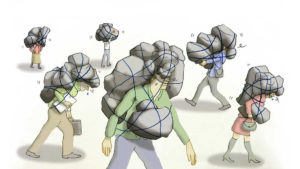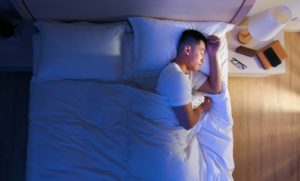Deep sleep is important for emotional resilience
Among all the factors contributing to poor health and early death, stress is perhaps the most pernicious yet commonly overlooked. While the stress response is a lifesaving biological function, enabling you to fight or flee an attacker, this “lifesaving” reaction ends up doing far more harm than good when triggered by financial worries, fear of public speaking, difficult bosses and traffic jams.

The sheer number of stress-inducing situations that face us on a daily basis can make it difficult to turn the stress response off. As a result, you may be marinating in corrosive stress hormones around the clock, and this can have serious consequences, from compounding a weight problem to elevating your blood pressure and raising your risk of a heart attack.1,2
Emotional Resilience Helps Lessen the Impact of Stress
Clearly, stress is an inescapable part of life; it’s how you address it that will determine whether it will translate into health problems later on. The stress reaction should dissipate as quickly as possible after the perceived danger has passed. The scientific term for this is “resilience” — your ability to rapidly return to normal, physically and emotionally, after a stressful event.
As explained by wellness coach Elizabeth Scott, diplomate at the American Institute of Stress and author of 8 Keys to Stress Management:3
“More resilient people are able to ‘roll with the punches’ and adapt to adversity without lasting difficulties; less resilient people have a harder time with stress and life changes, both major and minor. It’s been found that those who deal with minor stresses more easily can also manage major crises with greater ease, so resilience has its benefits for daily life as well as for the rare major catastrophe.”
Resilient People Are More Tuned in to Bodily Cues of Stress
Some people are naturally more resilient than others, and researchers have long pondered the reasons why. One hypothesis is that people who are more resilient have learned to listen to their body. In one experiment,4 elite adventure athletes and special forces soldiers were placed in a brain scanning machine while wearing a face mask that made it difficult to breathe once the researcher pressed a button.
What they discovered was that these people were able to closely monitor the signals from their body indicating rising panic, and suppress their physical response. In other words, they were acutely aware of their biological stress response, but didn’t overreact. The same test was later administered on “normal” people, who had first completed a questionnaire to gauge their self-perceived resilience.
Those whose scores suggested high resilience had brain activity very similar to the former group — the soldiers and elite athletes. Those with low resilience scores on the other hand, reacted in the converse way. As reported by The New York Times:5
“As their face masks threatened to close, they displayed surprisingly little activity in those portions of the brain that monitor signals from the body. And then, when breathing did grow difficult, they showed high activation in parts of the brain that increase physiological arousal.
In effect, they paid little attention to what was happening inside their bodies as they waited for breathing to become difficult — and then overreacted when the threat occurred. Such brain responses would undermine resilience, the scientists concluded, by making it more difficult for the body to return to a calm state.”
Sound, Deep Sleep Builds Emotional Resilience
Exposure to trauma can weaken your emotional resilience. The good news is you can rebuild or improve it as well. One solid strategy that can help build emotional resilience is good sleep. Research shows people who get more deep sleep are less fearful.

A study6 published in the Journal of Neuroscience claims to be the first to demonstrate that sound, deep sleep helps buffer against emotional distress, while sleeping poorly raises your risk of experiencing a difficult event as emotionally traumatizing. According to the authors:
“Sleep, and particularly rapid-eye movement sleep (REM), has been implicated in the modulation of neural activity following fear conditioning and extinction in both human and animal studies. It has long been presumed that such effects play a role in the formation and persistence of post-traumatic stress disorder, of which sleep impairments are a core feature.
In the current study, we employed long-term mobile sleep monitoring and functional neuroimaging (fMRI) to explore whether trait-like variations in sleep patterns predict subsequent patterns of neural activity during fear learning.
Our results indicate that higher baseline levels of REM sleep predict reduced fear-related activity in, and connectivity between, the hippocampus, amygdala and ventromedial PFC during conditioning. Additionally, skin-conductance-responses (SCR) were weakly correlated to the activity in the amygdala.
Conversely, there was no direct correlation between REM sleep and SCR, indicating that REM may only modulate fear acquisition indirectly. In a follow-up experiment, we show that these results are replicable, though to a lesser extent, when measuring sleep over a single night just prior to conditioning. As such, baseline sleep parameters may be able to serve as biomarkers for resilience, or lack thereof, to trauma.”
The Link Between REM Sleep and Fear Responses
As a general rule, if you sleep soundly for about eight hours, approximately two of those hours are REM sleep, the deepest sleep stage during which your body is fully relaxed. This is also known as the sleep stage when dreams occur. In this study, the fear conditioning involved showing the participants pictures of rooms lit with varying colors, some of which were paired with a mild electric shock to their finger.
Those who had gotten more REM sleep showed less connectivity between the amygdala, which processes fear, and the ventromedial prefrontal cortex and hippocampus, two regions involved in memory. They also had lower activity in those two areas overall. What this suggests is that their brains were not “hard-wiring” the fear impulse as strongly as in those who got less deep sleep.
As noted in The Atlantic,7 “PTSD is already known to be associated with sleep disturbances, and past studies have shown that sleep-deprived people have more activity in their amygdalae upon being shown upsetting pictures. So why might REM sleep make us less prone to encoding traumatic emotions?” A couple of different hypotheses have been proposed that might explain this phenomenon:
- REM sleep has been shown to clear norepinephrine from the locus coeruleus, where it is secreted. Norepinephrine, also known as noradrenaline, is involved in mental focus and attention, and readies both your brain and body for action. It also improves mood and alleviates pain.
- According to study author Shira Lupkin, researcher with the Center for Molecular and Behavioral Neuroscience at Rutgers University, “One theory is that this allows you to wipe the slate clean before you start again the next day. If you have less REM, then you have less of an opportunity to reduce your overall levels of norepinephrine, which will make you more reactive the next day to a given stimulus.”
- Stress hormones are also low during REM sleep, which allows your brain to activate memories — sometimes in the form of dreams — while stripping the memories of their “emotional tone.” Hence getting more REM sleep may make you less reactive to events that trigger an emotional memory.
How to Increase REM Sleep
The next question then becomes, how do you increase REM sleep, the deepest part of your sleep cycle? The answer presents a catch-22 for many, as it involves reducing your stress during the day and making sure you actually get enough total hours of sleep in the first place.
That means consistently getting the recommended eight hours of sleep every night, which in turn means getting in bed at a decent hour and not burning the midnight oil. For 33 different tips to improve your sleep quality, see this sleep article. Some of the most important yet frequently overlooked factors that can have a significant impact on your sleep are your nighttime exposure to:
- Electronic screens – Avoid using electronic media for at least an hour or more before bedtime, as the blue light emitted from these devices (including TVs) inhibit melatonin production. Melatonin not only regulates your sleep-waking cycle; it’s also a powerful antioxidant, and low levels have been repeatedly linked to an increased risk of cancer.8
If you do use electronic screen devices after sunset, be sure to use a blue light filter or use blue-blocking glasses.
The research is quite clear that people who use smartphones and computers, especially in the evening but also during the daytime, are more likely to report insomnia.9 One 2008 study10 revealed that people exposed to cellphone radiation for three hours before bedtime had more trouble falling asleep and staying in a deep sleep.
- Excessive light – Exposure to light at night interrupts your circadian clock and melatonin level, both of which play a role in how deeply you sleep and how well-rested you feel the next day. LEDs and fluorescent lights are particularly troublesome because the blue light peaks are not balanced by red and near-infrared.11

Incandescent lights are safer, as they emit red and near-infrared wavelengths and very few blue wavelengths. Candle light or salt lamps are ideal for evening use. Once you’re in bed, even very dim light (such as that from a nightlight or alarm clock) can have a detrimental effect on your sleep quality and quantity, and can harmfully affect your cognition the next day,12 so make your bedroom as dark as possible using blackout shades or an eye mask.
- Electromagnetic fields (EMFs) – from electric wiring in your bedroom walls also harmfully affect sleep by disrupting cellular communication and impairing melatonin secretion. EMFs also harm your mitochondria by producing oxidative damage, and have been linked to neuronal changes that affect memory and the ability to learn.13
Fortunately you can typically remediate it by turning off the circuit breaker to your bedroom before you go to sleep. You may need to turn off other rooms also if they are adjacent to your bedroom.
- Microwave radiation – from cellphones, cordless phones, Wi-Fi routers, baby monitors, smart meters and more, which have the ability to cause significant cellular and DNA damage,14,15,16,17 thereby accelerating the aging process.
By elevating voltage-gated calcium channels in the membranes of your cells, EMFs and microwaves have been shown to produce a variety of neuropsychiatric effects, including sleeplessness, anxiety, depression and dementia. Be sure to turn off your Wi-Fi and cellphones at night.
Tips to Reduce Sleep-Robbing EMFs in Your Bedroom
Eliminating EMF exposure can be tricky business, as most homes are quite literally swimming in electric currents. Still, there are ways to reduce EMF to a smaller or greater degree, depending on how far you’re willing to go. Here are some suggestions, ranging from modest to more extreme:
- Avoid running electrical cords underneath your bed. Especially avoid plugging in any transformers (power supplies) within 2 meters of your bed.
- One of the most important is to turn off your Wi-Fi at night. Since you don’t need internet access while sleeping, this is a simple remedy that most people can implement. Even better would be to permanently turn off your Wi-Fi and convert to a wired household.
- Move alarm clocks and other electrical devices away from your head, or ideally out of the room.
If electrical devices need to be in your bedroom, keep them as far away from your bed as possible, preferably at least 1 meter. Cellphone chargers should be kept at least 1,5 meters away from your bed, while portable phone bases and wireless routers should be kept as far away from your bedroom as possible.
If you keep your cellphone in your bedroom it should be in airplane mode. Even at a distance of 30 feet it will blast you with microwave radiation all night long if it’s on.
- Avoid sleeping with your head against a wall that contains unshielded electric wiring and/or electric meters, circuit breaker panels, televisions or stereos on the other side. Unfortunately, few communities in the U.S. require wall wiring to be placed in metal-clad conduit. This is primarily done for fire prevention, but it also eliminates most electric fields.
Therefore, more than likely, you are exposed to electric fields that radiate from the wires in the wall at the head of your bed, even if you don’t have any electronics on the other side of the wall. The solutions in both instances is to turn off the power breaker to your bedroom and possibly other rooms that are directly adjacent to your bedroom.
Your Resilience Can Be Improved Through Focused Breathing
Focused breathing techniques are another way to enhance your emotional resilience, as it teaches you to notice internal stress signals and cues from your body. Lori Haase, clinical professor of psychiatry at the University of California, San Diego, who led the experiment on elite adventure athletes and special forces soldiers, suggests quietly paying attention to your breathing without otherwise reacting.

Over time, she says, this exercise should “teach you to have a change in breathing when anxious but be less attached to that reaction, which may help to improve your reaction in a stressful situation.”19 There are many breathing techniques out there, virtually all of which can help you get in touch with your body and calm down.
One simple technique is the 4-7-8 breathing exercise taught by Dr. Andrew Weil,20 who recommends using it “whenever anything upsetting takes place — before you react,” and “whenever you are aware of internal tension.” The key to this exercise is to remember the numbers 4, 7 and 8.
Sit up straight and place the tip of your tongue up against the back of your front teeth. Keep it there through the entire breathing process. Begin by breathing in through your nose to the count of four. Hold your breath to the count of seven. Exhale through your mouth to the count of eight, making an audible “woosh” sound.
That completes one full breath. It’s not important to focus on how much time you spend in each phase of the breathing activity, but rather that you get the ratio correct. You can do this exercise as frequently as you want throughout the day, but it’s recommended you don’t do more than four full breaths during the first month of practice.
Later you may work your way up to eight full breath cycles at a time. If you commit to it, you may be pleasantly surprised by how quickly and easily it can center and relax you.
Conquer Stress With Energy Psychology
Besides breathing exercises, there are many other helpful stress management tools. Another favorite is the Emotional Freedom Techniques (EFT), an energy psychology tool that can help reprogram your body’s reactions to everyday stress, thereby reducing your chances of developing adverse health effects.
It’s similar to acupuncture, which is based on the concept that a vital energy flows through your body along invisible pathways known as meridians. EFT stimulates different energy meridian points in your body by tapping them with your fingertips, while simultaneously using custom-made verbal affirmations.
By doing so, you reprogram the way your body responds to emotional stressors. Since these stressors are usually connected to physical problems, many people’s diseases and other symptoms can improve or disappear as well. For a demonstration, please see this video, featuring EFT practitioner Julie Schiffman.
For serious or deep-seated emotional problems, see an experienced EFT therapist, as there is a significant art to the process that requires a high level of sophistication if serious problems are to be successfully treated.
Other Stress Management Techniques
Stress is so widespread as to be “pandemic” in today’s modern world, but suffering ill effects from stress is not an inevitable fact. A lot depends on how you respond to these day-to-day stresses. As you learn how to decrease your stress level and increase your resilience, your health and well-being will improve as well. There are many different stress reduction techniques. The key is to find out what works best for you, and stick to a daily stress-reduction program.
Just remember, a key strategy is to make sure you get adequate sleep, as sleep deprivation dramatically impairs your body’s ability to handle stress, and blunts your resilience. Aside from what it was already discussed above, other stress management approaches include the following:
- Regular physical activity
- Meditation – Taking even 10 minutes to sit quietly, such as during work breaks, can help decrease your feelings of stress and anxiety.
- Awareness training
- Yoga – Health benefits from regular yoga practice have been shown to decrease stress, improve sleep and immune function, and reduce food cravings, among other benefits
- Social connectedness
- Laughter and levity
- Spend time in nature
- Music and nature sounds
- Schedule time to have fun
- Aromatherapy
Sources and References:
1. Nature Medicine June 22, 2014; 20: 754-758
2. mBio June 10, 2014: 5(3); e01206-14
3. Verywell.com July 1, 2017
4. Biological Psychology January 2016; 113: 37-46
5, 19. New York Times January 13, 2016
6. Journal of Neuroscience October 23, 2017; 1578-17
7. The Atlantic October 23, 2017
8. Biomed Research International 2014, article ID 169459
9. Behavioral Sleep Medicine 2014 Sep 3;12(5):343-57
10. URSI.org
11. Harvard Health, Blue Light Has a Dark Side
12. Neuroimage 2010 Apr 15; 50(3-3): 1313–1319
13. MedCrave August 29, 2015
14. Rev Environ Health. 2015;30(2):99-116
15. International Journal of Innovative Research in Engineering and Management, September 2015; 2(5)
16. J Cell Mol Med. 2013 Aug;17(8):958-65
17. Current Chemical Biology 2016; 10(1): 74-82
18. Amazon, Talking Clock
20. DrWeil.com, The 4-7-8 Breath: Health Benefits & Demonstration
yogaesoteric
October 10, 2023
